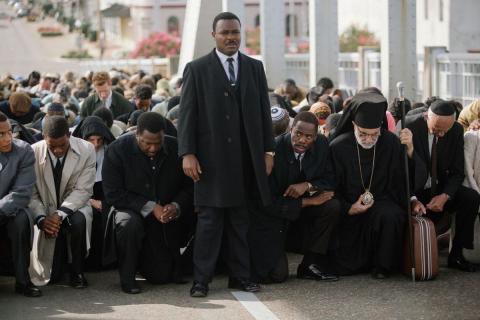In the wake of this past summer, Martin Luther King Jr. has been the central figure in a dishonest campaign of historical revisionism. Politicians and political correspondents have often contrasted King’s nonviolent protests with the riots in the summer to try and delegitimize the Black Lives Matter Movement--misrepresenting King's often radical fight for human and civil rights. With these disingenuous reminiscences of those idyllic protests, Director Ava Duvernay sets out to capture the true nature of King’s message in her timely biopic: Selma.
Released a few months after the Ferguson protests in November of 2014, Duvernay’s film chronicles the 1965 marches against Black voter suppression from Selma to Montgomery, organized by the Southern Christian Leadership Conference (SCLC, led by King) and the Student Nonviolent Coordinating Committee (SNCC, led by the late John Lewis). Spurred by the 16th Street Baptist Church Bombing and the police shooting of Jimmie Lee Jackson, King, played by David Oyelowo, struggles to handle his responsibilities as the figurehead of the Civil Rights Movement. He contends with leading the marches (that police often turn violent), surveillance by Lyndon B. Johnson and the FBI, who oppose his protests in Selma, and his deteriorating home-life after his wife, Coretta King, learns of his extra-marital affairs. Through these intertwining responsibilities, Duvernay depicts King honestly--an extraordinary but deeply flawed man--while also capturing the trials and achievements of the Selma campaign. This includes the infamous Bloody Sunday, the completed march from Selma to Montgomery, and the introduction of the Voting Rights Act of 1965, securing the right to vote for African Americans throughout the United States.
Selma excels when detailing both the infringements on African American voting and the violence protestors faced while confronting voter disenfranchisement. Duvernay succinctly identifies how the Southern States suppressed Black votes in two informative scenes. First, early when Annie Lee Cooper (played by Oprah Winfrey) has her voter registration denied after failing to complete an impossible oral literacy test. And Second, when members of SCLC discuss the various voter suppression tactics the Southern States employ, including poll taxes, voting vouchers, and newspaper recognition for registered voters—all of which made voting either impossible or potentially life-threatening for African Americans. These scenes are well-produced, educational, and flow seamlessly with the events of Selma.
Duvernay also uses harrowing realism in depicting the violent episodes leading up to and during the Selma marches. This includes the 16th Street Baptist Church Bombing, the police murder of Jimmie Lee Jackson, and Bloody Sunday, where Alabama state troopers brutalized peaceful Black protestors on the Edmund Pettus Bridge. Selma lays historical wounds bare but does so in a way that is faithful to the Selma protests without glorifying atrocities as the only form of Black suppression. It’s an arduous balancing act, but Duvernay depicts the violence and disenfranchisement of the period effectively and in good taste.
Duvernay’s depiction of King’s Selma campaign, however, pigeonholes the film’s capacity for critique. The director falsified Lydon B. Johnson’s participation in enacting the Voting Rights Act, citing that she “wasn’t interested in making a white-savior movie," which was met with a wave of criticism from scholars and critics alike. While I understand that Duvernay would want to center her discussion around the Black activists of Selma, this move simplifies the politics at play during the protests. Lyndon B. Johnson is a complicated figure in the Civil Rights Movement—he both authorized smear campaigns by the FBI against King, yet drummed up support in Congress for civil rights legislation—but there is no doubt he played a significant role in passing the 1965 Voting Rights Act. Duvernay could have used Johnson's duality to comment on how optics and politics are better barometers for change than morality, but instead frames Johnson as being reluctant for the sake of villainy.
Johnson’s omittance ultimately cheapens Selma's political message. The Civil Rights movement had a series of complex politics that amounted to massive strides for the Black community, yet Duvernay opts to depict it as simply King and his will-power toppling over the white establishment. That feels good from an emotional perspective, but the film misses an opportunity to criticize the same politics of incremental change and optics that are as apparent in the 2020s as they were in the 1960s. Yes, Duvernay avoids white saviorism, but is misrepresentation and oversimplification an adequate price for Black agency?
Even with these flaws, Selma is still a standout in the limited genre of civil rights biopics. Duvernay wields tragedy, disenfranchisement, and social uprising to craft a tasteful and (partially) informative rendition of the Selma campaign—one that parallels protests during the 2010/2020s Movement for Black Lives. Yet, the purposeful omittance of Johnson—and thus the complex motivations of activists and politicians alike—cause Duvernay to drift into a simplistic politics of good vs. evil. In this sense, Duvernay misrepresents the challenging politics of the Civil Rights era and incremental change for the sake of Black agency; a trade-off that hurts the overall message of Selma. With that, Selma is still a timely biopic that has become even more relevant nearly seven years after it was initially released.
Score: 3/5
